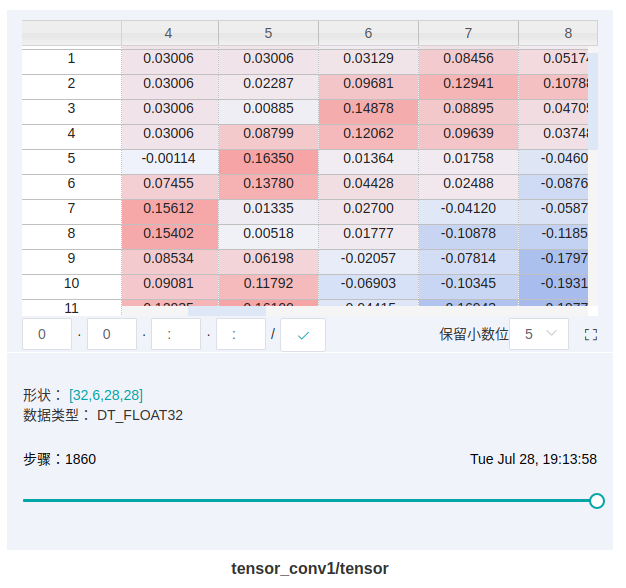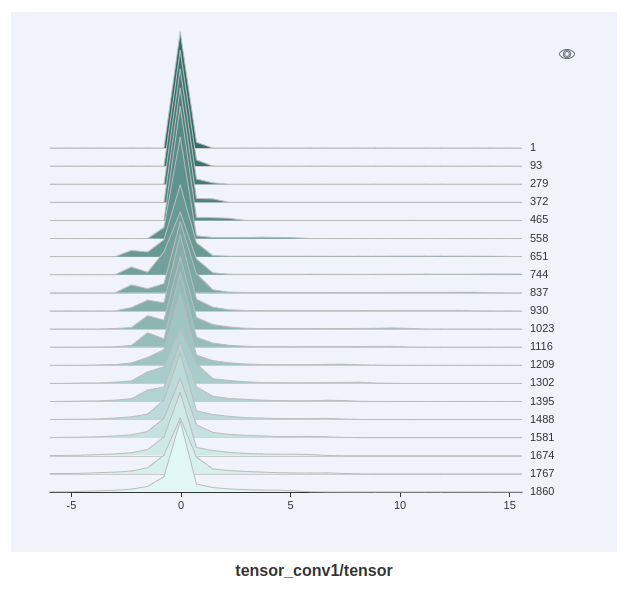张量可视设计
特性背景
张量可视能够帮助用户直观查看训练过程中的Tensor值,既支持以直方图的形式呈现Tensor的变化趋势,也支持查看某次step的具体Tensor值。Tensor包括权重值、梯度值、激活值等。
总体设计
Tensor可视主要是解析由MindSpore的TensorSummary算子记录的Tensor数据生成的Summary文件,并把结果返回给前端展示。
MindInsight解析时会遵循proto文件(Google Protocol Buffer,是一种高效便捷的结构化数据存储方式)来解析Tensor数据,然后把数据缓存起来,在前端查询特定数据时将其返回供前端展示。
Tensor可视支持1-N维的Tensor以表格或直方图的形式展示,对于0维的Tensor,需要通过ScalarSummary来记录并在标量可视中展示。
在表格视图中,可以查询当前缓存中特定step的Tensor数据,后台通过切片操作使得用户单次可以查询任意0-2维的Tensor数据。
在直方图视图中,可以查询当前缓存中所有step的直方图数据。
后端设计
张量可视相关的类主要有TensorContainer、Histogram以及TensorProcessor类,其中TensorContainer用于保存Tensor的具体值、维度、数据类型、最大值、最小值、直方图等信息,这里的直方图引用了Histogram的数据。Histogram用于处理直方图相关的信息,包括保存桶个数,归一化缓存中所有step的直方图数据等。TensorProcessor用于处理与Tensor相关的HTTP请求,包括获取当前缓存中特定训练作业,特定tag有多少个step,每个step的Tensor统计信息,特定step的特定维度的Tensor数据(单次支持查询最多某两维的数据)以及特定tag的直方图数据。
前端设计

图1:表格展示
图1将用户所记录的张量以表格的形式展示,包含以下功能:
表格中白色方框显示当前展示的是哪个维度下的张量数据,其中冒号
:表示当前维度的所有值,可以在方框输入对应的索引(和Python的索引含义一致,支持负值)或者:来查询特定维度的张量数据。拖拽表格下方的空心圆圈可以查询特定步骤的张量数据。

图2:直方图展示
图2将用户所记录的张量以直方图的形式进行展示。
接口设计
在张量可视中,主要有文件接口和RESTful API接口,其中文件接口为summary.proto文件,是MindInsight和MindSpore进行数据对接的接口。 RESTful API接口是MindInsight前后端进行数据交互的接口,是内部接口。
文件接口设计
summary.proto文件为总入口,其中张量的数据(TensorProto)存放在Summary的Value中,如下所示:
{
message Summary {
message Image {
// Dimensions of the image.
required int32 height = 1;
required int32 width = 2;
...
}
message Histogram {
message bucket{
// Counting number of values fallen in [left, left + width).
// For the rightmost bucket, the range is [left, left + width].
required double left = 1;
required double width = 2;
required int64 count = 3;
}
repeated bucket buckets = 1;
...
}
message Value {
// Tag name for the data.
required string tag = 1;
// Value associated with the tag.
oneof value {
float scalar_value = 3;
Image image = 4;
TensorProto tensor = 8;
Histogram histogram = 9;
}
}
// Set of values for the summary.
repeated Value value = 1;
}
而TensorProto的定义在anf_ir.proto文件中。
